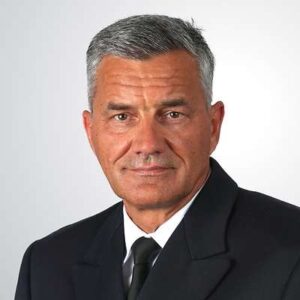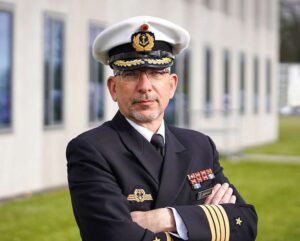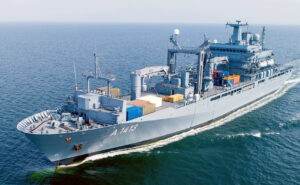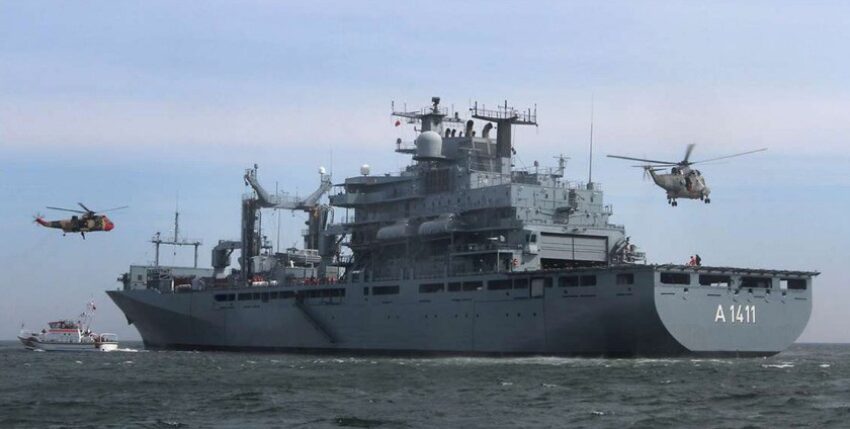From press releases of the Bundeswehr and the Rostock Naval Command
Naval Command, 28 April 2023
Order of the day at the end of the military evacuation operation Sudan
Bloody unrest broke out in Sudan on 14 April. The long-simmering conflict within the security apparatus is increasingly plunging Africa's third-largest country into chaos.
It quickly became clear: German citizens in the country, as well as any other people under protection, must be evacuated from the country by military means.
The aim of the German operation, like the international one, was to bring as many evacuees from Sudan to safety as possible. We completed this evacuation on 26 April for the time being. The German Armed Forces have so far been able to airlift more than 700 people out of the country to safety.

Even though the German military evacuation was ultimately carried out exclusively by air - as Commander of the Fleet and Support Forces, I would like to expressly thank all the naval forces involved!
The navy had already been ready to march from 17 April. At the same time, we set up staff elements and sent liaison personnel to the Operations Command.
At the same time, the navy adapted its maritime plans on an ad hoc basis: This meant that the task force provider BONN could act as a base for a possible sea-based evacuation. We embarked the naval forces from the naval battalion to the CTG staff and medical personnel on the BONN with the utmost professionalism and speed and moved them to the area of operation.
The decisive factor in achieving operational readiness for the sea-based military evacuation option at very short notice during these hours was the people behind it: they all acted pragmatically. From the Crisis Response Working Group in the Naval Command to our men and women on board, the many helping hands in the background and our liaison officers abroad - they all made a decisive contribution, each and every one of them in their own place.
In the meantime, all those embarked have returned to their home units. The units involved have resumed their original plans. Even though we ultimately did not have to pursue the sea-based evacuation option, you have every reason to be proud of this achievement. My special thanks and appreciation go to all of you: BRAVO ZULU! Well done!
Frank Lenski, Vice Admiral
---------------------------------
There is also an interview by Marcus Mohr with someone who has already been through this.
Rescue at sea: "You have to live with what you have"
State of affairs
Rescuing people fleeing from a coastal area is an important secondary task for the navy. Andreas Schmekel had to put it into practice in 2011.
At the end of April, the German Armed Forces rescued hundreds of people from the civil war-like unrest in Sudan. The "Bonn" task force provider, which is currently operating in the Mediterranean, was also on standby for this latest evacuation operation.
The case was similar twelve years ago with the sister ship "Berlin": at that time, it was in the Mediterranean together with the frigates "Brandenburg" and "Rheinland-Pfalz" as an operational training unit when violence broke out in North Africa during the so-called Arabellion in early 2011. European nationals were evacuated from Libya by the air force, among others, and the naval vessels rescued foreigners who had fled Tunisia by land.
The first officer of the "Berlin" at the time was Andreas Schmekel. Today, the sea captain is group leader for operational logistics at the naval command.
Interview
Mr Kap'tän, how does a naval vessel prepare for an Eevacuation mission?
When preparing for an evacuation mission, it is important for the ship's command, especially the commander, chief officer and chief officer, to get as clear a picture as possible of the situation ashore. Who needs to be evacuated? How many people need to be evacuated? What is the threat level? What is the specific mission? These are just some of the most pressing questions that need to be answered.

The question then arises as to which resources are required to fulfil the mission and which resources still need to be supplied to the ship. The preparation of a naval vessel is therefore never completely the same, as the specific mission differs in each case, as do the capabilities of our ships. Simply comparing a task force provider with a tender, a corvette or a 125 class frigate reveals clear differences.
How many people can be taken on board? Do I have a flight deck with helicopters? What are my paramedic skills? What self-protection capabilities do I have? How long do the evacuees have to stay on board? The answers to these questions will most likely lead to the conclusion that the ship needs additional capabilities and equipment. After all, the main mission of a naval vessel is never evacuation, so it is only ever partially prepared for an evacuation.
What external support does a naval vessel or its crew need?
Support comes primarily from Germany and is provided by a wide range of departments there. In particular, the Naval Command, the Operations Command, but also agencies such as the Bundeswehr Logistics Centre should be mentioned here. Various other agencies are also involved - it is a matter of a co-operation of forces.
Before the actual evacuation operation, the naval command and operational command primarily provide situation information. This is done via radio and satellite connections, as in other operations. However, the supply of personnel and material can theoretically be very extensive and costly.
Skills to be deployed can range from language mediators to doctors, military police, special forces and so on, right through to the GSG9 of the Federal Police. Material reinforcements can range from additional inflatable boats and blood reserves to porta-potties. All preparations must be realised as quickly as possible in cooperation with the responsible authorities in Germany. Speed is a decisive factor.
However, if the ship is far away from Germany in the area of operation, material and personnel support is - probably - not possible. So you have to live with what you have on the ship. The key to success is therefore to prepare as well as possible for as long as possible and to utilise the available resources flexibly from point X onwards.
What happens on board during preparation? Which rooms are available as temporary accommodation? How is the crew organised? For example, the smuts, who normally have a secondary function as paramedics.
Where people to be evacuated are accommodated on board depends on various factors. It is important to consider how many people need to be taken on board and for how long. Are there any injured people? How seriously are they injured? What cultural particularities need to be taken into account? What will the weather be like?

However, it must not be forgotten that the functionality of the ship must be maintained and that the safety of the ship and crew must be guaranteed. The solutions can then look very different. During Operation Pegasus on the "Berlin", for example, the evacuees were accommodated in the ship in the so-called longitudinal corridor between the service spaces and two neighbouring empty cargo holds, while other units used their hangars - solutions that were justified differently in each case. Accommodation on the upper deck is also conceivable, as in Operation Sophia on other naval vessels involved.
On the one hand, the crew is deployed as required for the safe operation of the ship, while on the other, additional tasks are allocated as required. We have always endeavoured to allocate the crew according to their strengths and weaknesses. This usually works without any problems, as motivation is always extremely high in an emergency.
For our smuts, for example, this can mean that they not only prepare meals for the crew, but also for the evacuees. Or they work in their permanent role as additional medical personnel ... or they simply help to look after the rescued. Flexibility is required.
What do you remember most about Operation Pegasus and the evacuations from Libya and Tunisia in February and March 2011?
To this day, I still remember how well and quickly the support from Germany worked. And above all, the creativity with which soldiers who had never worked together before worked effectively towards a single goal.










